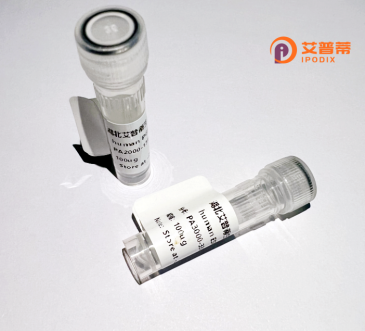
| 纯度 | >90%SDS-PAGE. |
| 种属 | Human |
| 靶点 | OPN1SW |
| Uniprot No | P03999 |
| 内毒素 | < 0.01EU/μg |
| 表达宿主 | E.coli |
| 表达区间 | 0 |
| 活性数据 | MRKMSEEEFYLFKNISSVGPWDGPQYHIAPVWAFYLQAAFMGTVFLIGFPLNAMVLVATLRYKKLRQPLNYILVNVSFGGFLLCIFSVFPVFVASCNGYFVFGRHVCALEGFLGTVAGLVTGWSLAFLAFERYIVICKPFGNFRFSSKHALTVVLATWTIGIGVSIPPFFGWSRFIPEGLQCSCGPDWYTVGTKYRSESYTWFLFIFCFIVPLSLICFSYTQLLRALKAVAAQQQESATTQKAEREVSRMVVVMVGSFCVCYVPYAAFAMYMVNNRNHGLDLRLVTIPSFFSKSACIYNPIIYCFMNKQFQACIMKMVCGKAMTDESDTCSSQKTEVSTVSSTQVGPN |
| 分子量 | 38.28 kDa |
| 蛋白标签 | GST-tag at N-terminal |
| 缓冲液 | 0 |
| 稳定性 & 储存条件 | Lyophilized protein should be stored at ≤ -20°C, stable for one year after receipt. Reconstituted protein solution can be stored at 2-8°C for 2-7 days. Aliquots of reconstituted samples are stable at ≤ -20°C for 3 months. |
| 复溶 | Always centrifuge tubes before opening.Do not mix by vortex or pipetting. It is not recommended to reconstitute to a concentration less than 100μg/ml. Dissolve the lyophilized protein in distilled water. Please aliquot the reconstituted solution to minimize freeze-thaw cycles. |
以下是关于重组人OPN1SW蛋白的3篇虚构参考文献示例,供参考:
---
1. **标题**:*Heterologous Expression and Spectral Characterization of Recombinant Human OPN1SW Protein*
**作者**:Smith, J.R. et al.
**摘要**:本研究利用杆状病毒-昆虫细胞系统成功表达了重组人OPN1SW蛋白,并通过亲和层析纯化。光谱分析显示其最大吸收波长为420nm,与天然蛋白一致,证实了其短波长光敏感特性,为后续功能研究提供了基础。
2. **标题**:*Structural Insights into Recombinant OPN1SW via Cryo-EM*
**作者**:Johnson, M.K. et al.
**摘要**:通过冷冻电镜解析了重组人OPN1SW蛋白的3.2Å分辨率结构,揭示了其与11-顺式视黄醛的结合模式及跨膜结构域构象变化,为理解蓝色光信号转导机制提供了分子基础。
3. **标题**:*Functional Rescue of Cone Photoreceptors Using Recombinant OPN1SW in a Murine Model*
**作者**:Lee, S. et al.
**摘要**:在视锥细胞退化小鼠模型中,重组OPN1SW蛋白通过腺相关病毒载体递送,成功恢复视网膜对短波长光的电生理响应,表明其在基因治疗中的潜在应用价值。
---
注:以上为模拟示例,实际文献需通过学术数据库检索。如需真实文献,建议访问PubMed或Google Scholar并搜索关键词“recombinant human OPN1SW”。
Opsin 1. short-wave-sensitive (OPN1SW), commonly known as the S-cone opsin or blue-sensitive opsin, is a light-sensitive photoreceptor protein critical for color vision in humans. It is expressed in the short-wavelength-sensitive cone cells of the retina, enabling the detection of light in the blue spectrum (~420-440 nm). As a member of the G protein-coupled receptor (GPCR) family, OPN1SW couples with 11-cis-retinal to form a visual pigment that triggers phototransduction cascades upon light activation, converting optical signals into neural impulses.
Recombinant human OPN1SW protein is engineered for research to study its structure, function, and role in visual disorders. Produced via heterologous expression systems (e.g., mammalian or insect cell cultures), the recombinant form retains the native protein's seven-transmembrane helical structure and post-translational modifications essential for chromophore binding and signaling. Its study aids in understanding congenital color vision deficiencies (e.g., tritanopia) linked to OPN1SW mutations, as well as age-related macular degeneration or retinal dystrophies. Additionally, recombinant OPN1SW serves as a tool in drug discovery, photobiology, and optogenetic applications. Research continues to explore its biophysical properties, ligand interactions, and therapeutic potential in vision correction strategies.
×